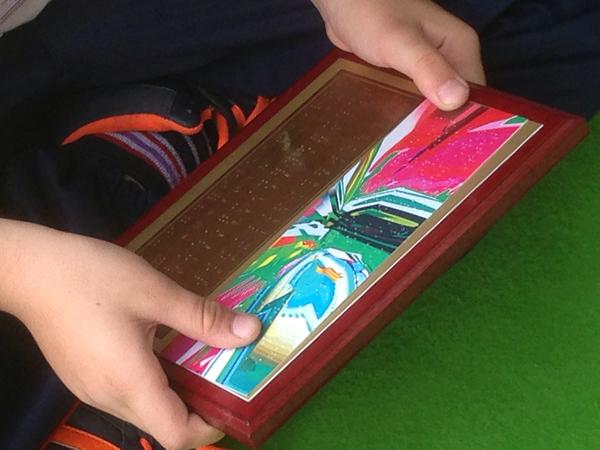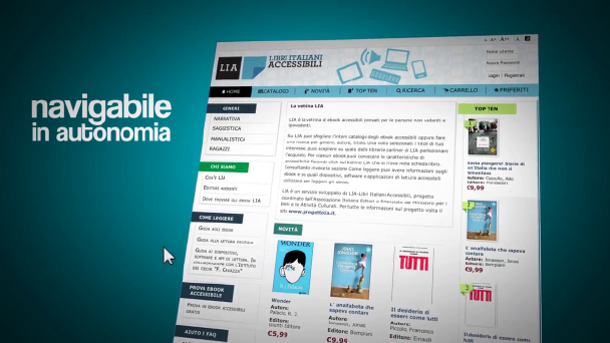What is the idea behind LIA? What is its mission? What problems is it trying to solve?
 Fondazione LIA’s mission is to promote books and reading in all forms, traditional and digital, through activities of education, information, sensitization and research, guaranteeing its fundamental principles: accessibility, integration and sociability.
Fondazione LIA’s mission is to promote books and reading in all forms, traditional and digital, through activities of education, information, sensitization and research, guaranteeing its fundamental principles: accessibility, integration and sociability.
True accessibility requires complex interactions among all the participants in the industry. It is not enough that an e-book is accessible, a blind reader may struggle because of the inaccessibility of e-reading software or of a device, or may not be able to acquire the e-book because the sales platform or online payment system are not accessible.
Developments in digital technology have widened opportunities for access to books by the blind. Up until now, accessible versions have been produced on an ad hoc basis by specialist structures, on demand from individual users, at high cost and taking a long time. With LIA the production of accessible files is moved back to source and integrated into the normal publishing flows of production and distribution. Visually impaired readers thus no longer have to select the desired book, buy it, request the production of an accessible version based on legal exception, and wait until this version is created and delivered. Instead they can reach accessible versions directly, in the same way and on the same timescale as any other reader.
Today, there are over 10,000 fiction and non fiction e-books in the LIA catalogue (www.libriitalianiaccessibili.it), produced by 65 publishers and publishing brands (which represent about 80% of the Italian publishing market). Every month the catalogue grows by more than 400 new books.
How is LIA structured and financed?
LIA launched in January 2011 as a joint project between AIE-Associazione Italiana Editori (Italian Publishers Association), its service company Ediser Srl and mEDRA Srl (a joint venture between AIE and the university consortium CINECA). The partnership had the support of MiBACT, Italy’s Ministry of Culture and Tourism. In June 2013 the LIA service went online and in May 2014 the LIA Foundation was set up, taking over its activities and guaranteeing their continuity over time.
LIA is a participatory Foundation created by AIE, open to the participation of other organizations interested in collaborating to achieve our mission. All the major Italian publishing groups and some of the small or medium ones are now members.
There are different options to participate and support the Foundation with an annual fee: ordinary participants for single persons, supporter participants for all kind of companies interested in promoting accessibility – not only publishers. We also foresee the participation of institutional participants (both Italian and foreign), where collaboration will be defined case by case.
We are experimenting with different ways to fund LIA’s activities. AIE is supporting the start-up phase and institutional financing is expected as well. Other expected incomes will be participants’ annual fees, contributions for special projects, revenues of the services described above and private donations. Anyone can support the LIA Foundation by making a donation to IBAN: IT51 J033 5901 6001 0000 0102 231. A consultant has been hired to support fund raising activities.
In April, two well-known Italian singers (Samuele Bersani and Pacifico) decided to donate to LIA the royalties from their new song, Le storie che non conosci, written for #ioleggoperché, a national campaign organized by AIE to promote reading. The song went to number one in the charts, and the initiative has been very important in creating visibility for the Foundation.
What activities and projects is LIA running today?
Beside the enrichment of the catalogue, LIA operates various activities and services. It manages an observatory which monitors, in collaboration with other international organizations, the development of the ICT sector, testing and evaluating the level of accessibility of e-reading solutions (hardware and software) available on the market.
The Foundation promotes, organizes and supports communication initiatives, networking and storytelling on subjects related to accessible reading. For example, the “Readings in the Dark” events in which famous authors read extracts of novels and stories alongside visually impaired readers who use different options (print braille, braille display, tablet or smartphone to enlarge characters, text to speech). It is an amazing way to explain the advantage of digital for visually impaired people.
LIA wants to promote accessible culture and enhance its social impact in a variety of fields and contexts. For example, LIA recently launched ACT – Accessible Theatre, a professional workshop of accessible reading for the theatre.
LIA offers feasibility studies and support in implementing accessible production workflows, verification of e-book accessibility and, if necessary, conversion and certification of digital publications. Our first customer was a big Italian bank, Banca Intesa San Paolo.
LIA has also created a catalogue of professional training courses on accessible production to help publishers, suppliers, publishing professionals and other organizations to learn how to create accessible content autonomously.
We also offer training courses for end users, such as visually disabled people, the elderly, trainers and teachers, with the goal of extending and improving knowledge about the use of digital content and new e-reading technologies.
What are your proudest achievements so far?
 LIA has been widely acknowledged for best practice in the field of accessibility. We are proud to be the first organization at an international level to implement a real, mainstream project. The way we produce e-books is highly efficient, allowing us to build the 10,000 title catalogue and to involve a great number of Italian trade publishers.
LIA has been widely acknowledged for best practice in the field of accessibility. We are proud to be the first organization at an international level to implement a real, mainstream project. The way we produce e-books is highly efficient, allowing us to build the 10,000 title catalogue and to involve a great number of Italian trade publishers.
The collaboration and engagement which we’ve been able to achieve with the Italian Blind Union and with our network of blind and partially sighted people has been critical. They’ve helped us throughout the testing phase and in our promotion and training activities.
What are your hopes and plans for the future?
There’s still a lot of work to do. LIA has reconceived the chain of accessibility in publishing, acting as facilitator and activator of synergies among the various players who intervene in the process of devising, producing and distributing e-books.
We think now is the right time to create an international network, aimed at drawing attention of international e-retailers, hardware and software producers, national and international institutions about the relevance of working on projects which gather together all the actors in the book value chain.
We are seeking further funding to scale LIA’s service to other kinds of publishing products, such as complex layout books, university and school texts.
How can publishers and the wider publishing community get involved?
It is very important to work closely with the people inside publishing houses, creating real awareness at management level of the problems visual impaired people can have in reading non accessible content, and showing them the real advantages of digital reading.
We must also provide people working in production with practical guidelines, offering specific training courses.
At an international level, the creation of a stronger network involving all the actors working on projects, studies and innovations and who are committed to deliver and to promote digital accessible reading will help accelerate the process.
LIA will host the Daisy Board in Italy in November and plans to organize a one day international event focused on discussing these topics.

